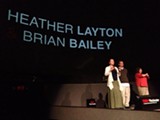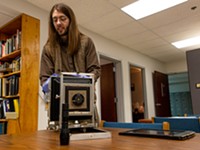[
{
"name": "500x250 Ad",
"insertPoint": "5",
"component": "15667920",
"parentWrapperClass": "",
"requiredCountToDisplay": "1"
}
]
Welcome to the first day of our post-election season, Rochester. Our neighborhoods are littered with candidate signs and unwanted mailers, and the rhetoric-laden commercials have returned to other people trying to sell you other things. The coming days will be filled with analyzing the results and their meaning for us, with abundant arguments and fist-shaking.
But perhaps the bulk of our discontent arises from the burden of our perceived helplessness. Our problems are undoubtedly huge, and they are immediate, not something to be feared on the periphery. This fact was underscored during one of the most sobering talks of the day at this year's TEDxRochester event, held on Monday, November 4, at the Rochester Museum and Science Center's Strasenburgh Planetarium. Toward the end of the day, Ann Johnson, Director of ACT Rochester -- an organization that provides credible, independent, and timely data regarding our community -- itemized the percentages that tell the story of our disparity in terms of poverty, health, education, and employment. For example, according to Johnson, a startling 46 percent of children in Rochester are living in poverty, which is twice the county, state, and national levels. The unemployment rate in the city is 40 percent higher than in Monroe County. And minorities make up the larger percentages of these numbers, she says.
Johnson's recitation of bare fact concluded with a simple call to action: take a long, good look at these problems. Learn as much as possible about the problems facing the community, and talk openly not only with those who are like-minded, but also with those who think differently than you do. And then work to generate the spark and stoke the fire within this community to affect real and sustainable change. We don't have to know what that looks like right now, but genuinely educating ourselves is a necessary beginning.
The theme of this year's talks was "Changing Perspectives," each of the talks strongly or loosely connected to the concept of shifting slightly around a problem and addressing it from a fresh angle. While each of the speakers was engaging and many were very good, the highlights came from those who called for direct action while leading by example.
Much is stolen from communities when the people who make up the village won't work for their own health and stability. Our capacity and willingness for direct action is arguably the most important thing we have, and we should seize it while we are able. We cannot launder our responsibility toward one another through agencies any longer, nor rely on outer resources and implementation of good ideas. Some of the people on the TEDxRochester stage knew that.
But aside from looking around and learning, where do we begin? Other individuals who spoke during the course of the day gave examples of small, manageable ways that we can make a surprisingly effective direct impact. Kathy Turiano gave an inspiring speech about inter-generational trust and cooperation as critical factors in actualizing our dreams. Her particular experience with this applied to her business, but the potential applications of the idea are vast. Turiano founded Joe Bean Coffee Roasters in Webster in 2004, but realized within a few years she needed to radically rework her business model. In 2010 the new Joe Bean materialized within the city of Rochester, now with Kathy's son, Ben, as a partner, and achieved new success as Rochester's first roaster to utilize the "profile roasting" technique, offering artisan-brewed coffee and hands-on coffee classes.
Restorative justice has been gaining attention for its efforts to heal communities broken by poverty and crime, reduce recidivism, and to educate the public about the many shades of gray involved. Filmmaker Ray Manard of Crystal Pix, Inc., introduced the audience to some cruel numbers: there are 2.3 million adults incarcerated in the USA - the largest number of incarcerated adults of any other nation in the world -- and the number climbs to 7 million when you include adults who are currently on probation or parole. So, there are roughly 10 million children in our country with parents ensnared in some level of the justice system.
The kids suffer in complex ways for obvious reasons. Manard says that people who maintain a bond with their children are less likely to have an incident while imprisoned, violate parole, or return to the slammer. The Storybook Project is a program that began in Texas, with some volunteers facilitating incarcerated adults recording themselves reading stories to their kids, and sending those recordings home to the children. The project is the subject of the upcoming documentary, "Turn the Page," which was screened at the TEDxRochester talks. Witnessing the tenderness in the voices of the parents is a powerful step against holding a black-and-white view of the faceless incarcerated masses.
Heather Layton and Dr. Brian Bailey collaborate on multidisciplinary "social intervention" art projects that cross the borders of race, religion, class, gender, and nationality, and challenge their audiences to reconsider stubbornly held assumptions about others. The couple gave examples of the kinds of work they've created, as well as work by other social intervention artists who have inspired them. Layton and Bailey's work encourages us to get to know our world and the people within it directly instead of assuming the validity of official stories.
Architect, urbanist, and author Howard Decker's talk was reminiscent of points made by one of the 2012 speakers, Mike Governale of Rochester Subway. He appealed to the audience to consider the Rochester of 100 years ago while we consider the correct ways to move into the future. We're standing amid failed projects, squandered opportunities, and auto-dominated development. "Cities are physical expressions of commerce," he says, and "ours doesn't make sense economically." Decker called for a return to a dense downtown, walkable city planning, supporting of local businesses that feed earnings back into the local economy, and speaking out for our city. "Each one of us needs to become an activist and advocate," he says.
The event concluded with a gentle and powerful reminder to live up to our commitments. Serial entrepreneur, executive coach, former attorney, and Biz Talk Radio Host on WCEOhq Radio Bruce Peters spoke about using personal commitment scorecards in order to accomplish more (and specifically more of the right things), to achieve clarity around the things that you commit to doing, to make more realistic commitments in the future, and to hold others accountable for what they promise. Many of us are overcommitted, and failing to accomplish what we say we will do has an "integrity outage" that even negatively impacts our health, he claims. If this sounds familiar -- and if you're a busy person, it probably does -- this might be a good tactic to try out. As leaders, it's of utmost importance to eliminate hypocrisy in our lives, Peters says.
Latest in Culture
More by Rebecca Rafferty
-

Beyond folklore
Apr 4, 2024 -

Partnership perks: Public Provisions @ Flour City Bread
Feb 24, 2024 -

Raison d’Art
Feb 19, 2024 - More »



